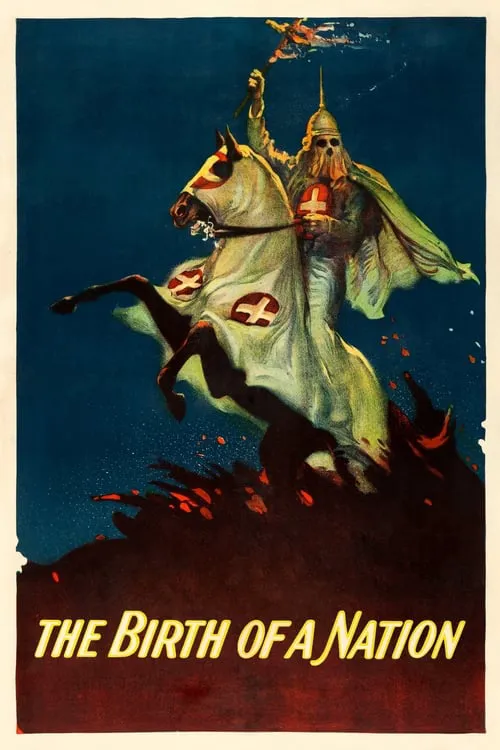The Birth of a Nation

Plot
"The Birth of a Nation" is a 1915 epic silent film written, produced, and directed by D.W. Griffith, based on the 1905 novel "The Clansman: A Historical Romance of the Ku Klux Klan" by Thomas Dixon Jr. Set in the midst of the American Civil War and the subsequent Reconstruction era, the film explores the tumultuous relationship between two families with opposing views on slavery and the rights of African Americans. The story takes place in the late 1860s in South Carolina, where the Stoneman family, abolitionist Northerners, reside alongside the Cameron family, wealthy Southern landowners. The Stonemans, consisting of Dr. and Mrs. Austin Stoneman, their daughters Elsie and Margaret, and the family's loyal servants, live on the periphery of the rural town. In stark contrast, the Camerons, led by Colonel Ben Cameron, are a proud family of Confederate veterans who adhere to a strict code of honor and tradition. As the Civil War rages on, Colonel Ben Cameron and his cousin, Phil Stoneman, a loyal Stoneman family member, are captured in battle. In an attempt to save her cousin's life, Elsie Stoneman, a young and compassionate woman, petitions the governor for his pardon. The governor's decision grants Ben Cameron's pardon, allowing him to return to his family. In the midst of the post-war Reconstruction era, tensions between the Stonemans and the Camerons rise. Colonel Cameron is outraged by the newly formed South Carolina government, which is comprised of African Americans and their Northern supporters. Frustrated by the loss of power and the erosion of Southern culture, Cameron seeks a solution to these problems. He joins a group of disheartened white Southerners who share his feelings of resentment and disillusionment. The group eventually becomes the Ku Klux Klan, an organization founded by Cameron to protect white Southerners and restore their honor. As a founding member, Cameron rallies his fellow Klansmen, imbuing them with a sense of purpose and duty to reclaim their heritage. Meanwhile, Elsie Stoneman, now a congressional aide to her father, becomes increasingly entangled in the conflict between the Klu Klux Klan and the newly formed South Carolina government. As the story unfolds, Silas Lynch, a former slave and newly appointed governor of South Carolina, emerges as a symbol of the post-war government. Through Lynch's character, Griffith critiques the idea of African Americans' participation in politics, reinforcing the narrative that African Americans were not prepared for self-government. This portrayal perpetuates the racist sentiment that fueled the rise of the Ku Klux Klan during the Reconstruction era. Phil Stoneman, initially aligned with his cousin Ben, becomes increasingly disillusioned with the Klu Klux Klan's violent tactics. He attempts to bring balance between the two families, hoping to resolve the tensions between them. However, Phil's efforts are in vain as the narrative takes a dark turn. Ben Cameron and Silas Lynch engage in a series of intense confrontations, culminating in a climactic showdown between the two men. The film culminates in a final, brutal confrontation between the Klu Klux Klan and the newly formed South Carolina government. The aftermath of this confrontation sets the stage for a bleak future in which the once-peaceful South is forever changed by the rise of the Ku Klux Klan. Upon its release, "The Birth of a Nation" sparked widespread controversy due to its portrayal of African Americans and the glorification of the Ku Klux Klan. Critics at the time lauded the film's cinematography, special effects, and epic scale, while others condemned its blatant racism. Despite this, the film became a landmark in American cinema, showcasing the power and majesty of the silent film era. However, the film's impact has been overwhelmingly negative, and it is now recognized as a prime example of racist and xenophobic filmmaking. Critics argue that the film reinforces white supremacist ideologies and propagates myths about the Reconstruction era. Moreover, it is essential to acknowledge that "The Birth of a Nation" perpetuates a distorted view of history, one that downplays the experiences and perspectives of African Americans during this period. Today, "The Birth of a Nation" serves as a cautionary tale about the dangers of unchecked power and the devastating consequences of racism. While its message may have been lost on many viewers in the past, the film's historical context and significance can now be reevaluated, highlighting both the racist undertones that fueled its creation and the lasting impact it has had on American cinema.
Reviews
Recommendations




